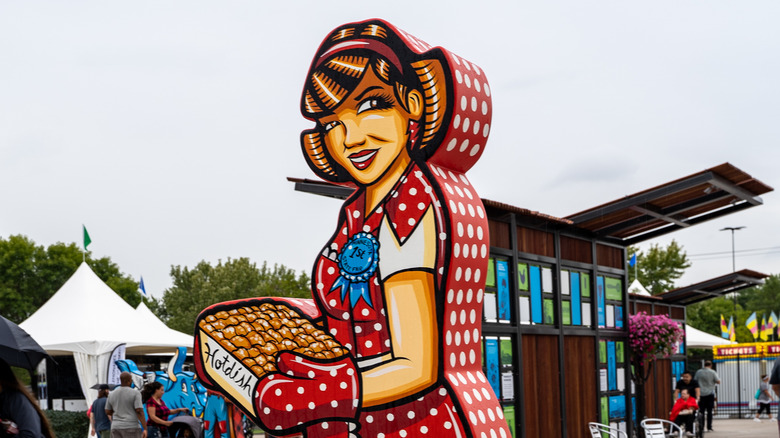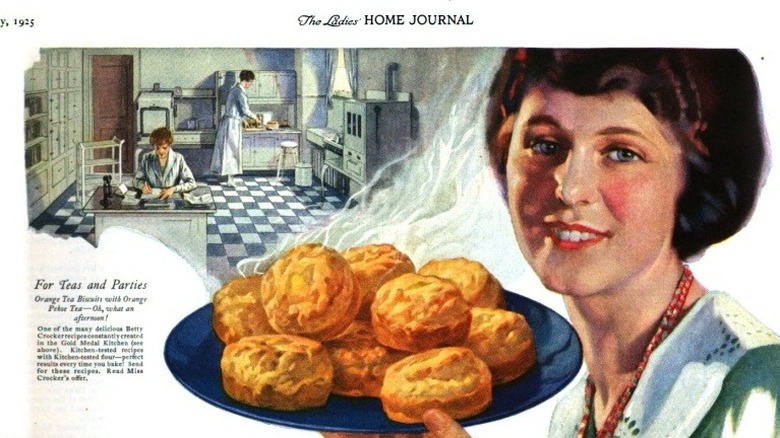The Real-Life Women Behind Betty Crocker
Say Betty Crocker today and modern minds turn to grocery store shelves stocked with cake and other boxed baking mixes. But before Betty's name became synonymous with a kitchen shortcut, she was a living trademark, a fictional homemaker brought to life by a team of women who worked for the Minnesota-based Washburn-Crosby Company, the parent company of Gold Medal Flour.
As the Betty Crocker website explains, in 1921 as part of an advertising campaign, Gold Medal Flour held a mail-in jigsaw puzzle competition. To the surprise of the company's all-male advertising department, American homemakers mailed in 30,000 completed puzzles, sending almost as many cooking questions along with them (via The Van Trump Report).
Seeing an opportunity, the company cooked up the persona of an everywoman housewife to act as the home cook's relatable best friend. The name Betty was chosen for its wholesome sound. Crocker was the surname of a recently retired and well-liked company director. Washburn-Crosby then began hiring more home economists to respond to all the cooking queries at Betty. As the brand explains, this was the start of the Betty Crocker Kitchens.
The staff behind the Betty Crocker Kitchens were well-educated, having studied home economics in college. What began as a job responding to letters eventually turned into recipe creation and testing, where they churned out countless recipe pamphlets and, eventually, cookbooks to encourage more flour purchases. The public was so keen on Betty Crocker that in 1958, Washburn-Crosby, now known as General Mills, built themed test kitchens, turning corporate HQ into a tourist destination, per Atlas Obscura.
Who were the real-life Betty Crockers?
While not much is known about the individual members of the famous Betty Crocker Kitchens, two women stand out as her public stand-in.
The American Association of University Women credits Marjorie Child Husted as the first Betty Crocker. A home economist and businesswoman, Husted managed Washburn-Crosby's Betty Crocker Homemaking Service 40-member staff. She became the voice of Betty in 1924 with the launch of the "Betty Crocker Cooking School of the Air" on Minneapolis radio station WCCO. The show proved so popular that NBC picked it up for syndication, becoming the nation's first cooking show (via Old Time Radio).
Husted even headed to Hollywood and interviewed stars like Joan Crawford and Clark Gable (via History Daily), positioning these famous faces as Betty Crocker devotees, just like her listeners. Those interviews launched Crocker into the celebrity stratosphere. By 1945, Betty Crocker was a bona fide star, even landing at the No. 2 spot on "Fortune" magazine's list of the most popular American women, just behind first lady Eleanor Roosevelt. Although the article outed her as a fraud, Food & Wine says it did nothing to diminish Betty Crocker's popularity.
By 1949, a drop in prices brought more TVs into American homes, per the Wessels Living History Farm. Per the brand's own story commemorating 100 years of Betty Crocker, General Mills passed the Betty Crocker baton from Husted to vaudevillian Adelaide Hawley Cumming, who portrayed Betty Crocker from 1949 to 1964. Cumming played the beloved homemaker on television, hosting her own cooking shows and appearing on live commercials on popular programs like "The George Burns and Gracie Allen Show" (via Variety).

